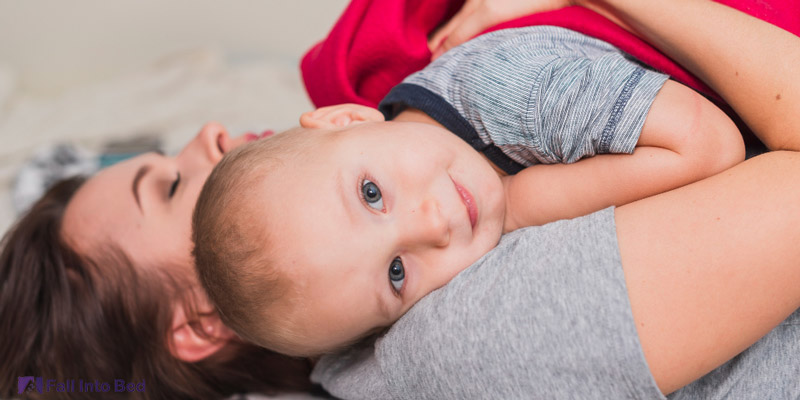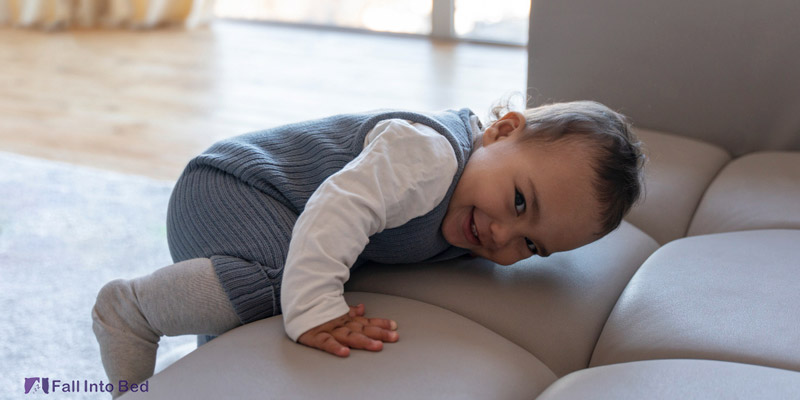What is 9 month-old sleep regression
Sleep regression in 9 month-olds occurs when you baby’s sleep patterns suddenly changes. They start waking up more often during the night, have a hard time falling asleep and other sings. It’s important to know that sleep regression is normal and it happens to almost all babies at some point. There are various reasons why this sleep regression happens, but not to worry this phase doesn’t stay as long as it seems.
Other than 9-month olds, we can mostly see sleep regression in 10 months, 14 months and 15 month-olds.
How much sleep do 9 month-olds need?
Before we get into the causes and solutions of sleep regression, we need to know how much sleep 9-month olds need and what is considered sleep regression.
Typically, a healthy 9-month old baby needs around 12 to 16 hours of sleep per day. This is usually divided into:
- 10 to 12 hours at night (though it may include some night-time waking)
- 2 to 4 hours during the day through 1 or 2 naps. Babies at this age are also developing more consistent sleep patterns, but it’s normal for sleep needs to vary slightly depending on the child.
you can check out sleep schedules for this age to understand the sleep pattern even better.

Signs of sleep regression in 9 month-olds
Sleep regression at 9 months is when a baby who used to sleep well suddenly starts waking up more at night, has trouble napping, or struggles to fall asleep. It’s completely normal and usually doesn’t last too long. Some common signs include:
- Waking up more at night (even if they used to sleep through)
- Shorter or more disrupted naps
- Trouble falling asleep at bedtime
- Being extra clingy or fussy during the day
At this age, babies are hitting some big milestones like learning to crawl, stand, or even start talking. Plus, they might be experiencing some separation anxiety. All of this can mess with their sleep. But don’t worry, it’s just a phase and will pass with some patience and a consistent routine.
Causes of 9 month sleep regression
Developmental milestones
Babies experience a lot of different milestones, especially during the first 2 years of their life. And it’s proven that developmental milestones affect sleep. At around 9 months, babies may begin to walk, talk, and develop other new skills. This burst of learning keeps their brain working overtime, which can lead to sleep regression.
In addition to mental strain, these new abilities can make babies excited, making them to practice their skills even in bed or during bedtime. As a result, their sleep might become more disrupted, causing them to sleep less than usual.

Separation anxiety
Separation anxiety usually kicks in between 3 months and 3 years, and it’s completely normal, most babies will grow out of it. During this time, they often get more clingy and may cry when their parents or caregivers leave, even if it’s just for a minute.
Bedtime can become a bit tricky because they might refuse to go to sleep unless their parents are right there with them. They might also wake up in the middle of the night and cry if they don’t see their caregiver nearby.
At this age, babies can get used to falling asleep only when being held, which can lead to some challenges later on. They might have a hard time sleeping independently in their crib if they rely on being held to drift off.
Teething
Teething can really throw a wrench into a 9-month-old’s sleep schedule. When those little teeth start to come in, it can be painful and uncomfortable for babies. This discomfort often makes them fussy and irritable, which can disrupt their ability to settle down for sleep.
You might find that your baby wakes up more frequently at night because of gum pain or pressure. They could also struggle to fall asleep initially since they’re feeling uncomfortable. During this phase, it’s common for babies to become extra clingy and want more cuddles and comfort. This need for closeness can make it harder for them to sleep well, leading to more restless nights and a bit of chaos in their sleep routine.

Big and sudden changes
Sudden changes in your baby’s routine can easily affect their sleep schedule. Changes like starting day-care, moving to a new house or travelling can be a cause of sleep regression.
How long does this sleep regression last?
Sleep regression at 9 months can be a bit of a rollercoaster ride, lasting anywhere from a few days to a few weeks. Most parents find that things start to settle down within about 2 to 6 weeks.
But remember, every baby is different! Some might bounce back quickly, while others might take a little longer to get back to their usual sleep routine. It’s all part of the adventure of parenting!
How to deal with the sleep regression?
Dealing with sleep regression at 9 months can be challenging, but there are some effective strategies to help both you and your baby through this phase:
- Stick to a routine; It’s important to keep a consistent sleep schedule to help your baby get into a sleepy mood when it’s time. This helps them to form a consistent sleep cycle. You can also use some tricks to put your baby to sleep in less than a minute.
- Practice new skills during the day; Practicing new skills in their milestones during the day can reduce their excitement for them when it’s bed-time.
- Provide comfort item or teether; If your baby is uncomfortable due to teething, you can give them teethers. But having a stuffed animal around them for sleep might be too soon for this age.

During this time, sticking to a consistent bedtime routine can really help. Think of it as a comforting lullaby for your little one, something familiar to ease them back into sleep. So hang in there; this phase will pass, and you’ll soon be enjoying those peaceful nights again!
Sweet long-lasting dreams! 💤








